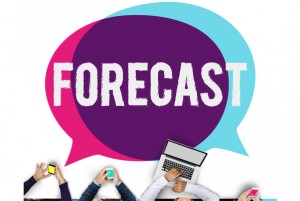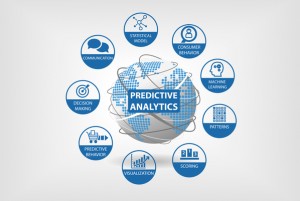BLOG/Strategy & Planning
Predictive Analytics: What is it and Why it is Important
What is Predictive Analytics?
At its core, Predictive Analytics is computers learning from past experiences to make forecasts about what might happen in the future based on statistical likelihood. Predictive Analytics uncovers statistical patterns and monitors processes to better understand the current business situation. Understanding how things are working now gives managers important insights on how one could improve situations for the future.One particularly valuable aspect of predictive analytics is that it can figure out customer preferences and can forecast what kind of products are likely going to appeal to a particular target audience. This is very useful in e-commerce because it helps save money and time since it can filter out advertisements for groups of individuals that are unlikely to want to buy particular products. The insights collected can help businesses get a “leg-up” on the competition, since knowing information about your customers that your competitors are unaware of could lead to a competitive advantage.
For example, e-commerce giant Amazon is a huge user of predictive analytics. Their highly sophisticated algorithms track data on their consumers, analyzes it, creates predictions about what they might be interested in purchasing next and can identify potential cross-sell opportunities. Amazon’s predictive analytics software can combine variables such as consumer’s demographic and psychographic information with data about past purchases to make product recommendations and create more targeted advertising. This helps Amazon sustain their competitive advantage and is a huge contributor to why they are so successful in the ecommerce space.
However, it is important to keep in mind that predictive analytics is not a magical crystal ball that can foresee the future. Although predictive analytics is getting more sophisticated and accurate it is still just using math and statistics to come up with very educated guesses of what may happen.
Even if it’s not 100% fool proof, predictive analytics knowledge is important in order to compete in today’s market, especially in the digital marketing and ecommerce spaces. It is something every business needs to invest in to stay competitive because forecasting software can be used in virtually any industry.
This is very useful in e-commerce because it helps save money and time since it can filter out advertisements for groups of individuals that are unlikely to want to buy particular products. The insights collected can help businesses get a “leg-up” on the competition, since knowing information about your customers that your competitors are unaware of could lead to a competitive advantage.
For example, e-commerce giant Amazon is a huge user of predictive analytics. Their highly sophisticated algorithms track data on their consumers, analyzes it, creates predictions about what they might be interested in purchasing next and can identify potential cross-sell opportunities. Amazon’s predictive analytics software can combine variables such as consumer’s demographic and psychographic information with data about past purchases to make product recommendations and create more targeted advertising. This helps Amazon sustain their competitive advantage and is a huge contributor to why they are so successful in the ecommerce space.
However, it is important to keep in mind that predictive analytics is not a magical crystal ball that can foresee the future. Although predictive analytics is getting more sophisticated and accurate it is still just using math and statistics to come up with very educated guesses of what may happen.
Even if it’s not 100% fool proof, predictive analytics knowledge is important in order to compete in today’s market, especially in the digital marketing and ecommerce spaces. It is something every business needs to invest in to stay competitive because forecasting software can be used in virtually any industry.
Who Uses Predictive Analytics and Why they use it
No matter the industry, many firms can benefit from using predictive analytics to improve their business. Whether it’s a Banking and Financial Services company that needs to analyze their customer’s data to detect and reduce fraud and measure credit risk, Health Insurance companies who would like to know which patients are most at risk for chronic diseases and what the best treatment methods and interventions will be or Manufacturing companies who would like to optimize distribution and service processes or identify and reduce quality and production failures. Of course, we can’t forget how much anything digital and ecommerce related can benefit from predictive analytics. Online Retail stores can use predictive analytics for countless activities including forecasting what merchandise is likely going to sell well, when to order and stock certain items, what items will appeal to particular markets, and it can help predict how effective certain promotional activities will be. Predictive Analytics is useful in an array of business settings because it has features that are useful to many different industries. Some of the most important and widely used include:Detecting Fraud and Reducing Risk
Predictive Analytic’s pattern detection helps spot criminal behavior and prevent it. Analysis can be done in real time to spot abnormalities and inconsistencies in order to fix the problems as soon as they arise.Improving Operations
Predictive analytics can help with managing resources and forecasting inventory needs. This ultimately helps businesses operate more effectively and efficiently.Optimizing Marketing Campaigns
Predictive Analytics can be used to determine customer responses or purchases and can be helpful when trying to identify cross-sell opportunities. These forecasting models can help with identifying and retaining loyal and profitable customers and is tremendously valuable for companies whose activities involve digital marketing and ecommerce.
Why YOU need to use Predictive Analytics
In the current market, data is constantly being collected and analyzed in order to be used to optimize business processes. It’s no longer a question of whether or not a company should utilize predictive analytics since using predictive analytics doesn’t set companies apart from one another anymore. Especially in digital marketing and ecommerce, all successful firms use forecasting models to their advantage, that’s partly what makes those successful companies so successful. It’s become more of a necessity to understand and embrace predictive analytics in order to remain a competitive player in the industry. With improved technology and easy-to-use software, mathematicians and statisticians are no longer the only ones who can understand and apply forecasting models to make strategic decisions, making this technology more accessible to a wider audience. With time, forecasting will only continue to grow, so it is important to stay up to date with the latest technology and knowledge surrounding it. Predictive analytics is very intricate and at times extremely complex, so feel free to say “Hey” and reach out to us if you have any questions or comments about forecasting and how it can help your business succeed in the ecommerce space. We’d love to hear from you!More from the
DO Blog

Designing & Building Product Finder Quizzes for eCommer...
Strategy & Planning / December 23, 2020
View Blog Post
3 Customer Motivation Strategies to Improve Your eCommerce i...
Strategy & Planning / July 27, 2020
View Blog Post
